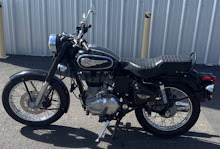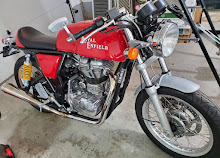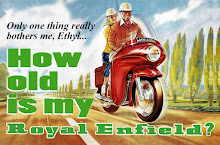 |
| Evelyn Waugh may have ridden a Douglas motorcycle, like this one from the 1925 Douglas overseas brochure. |
Aired on PBS in 1981, the BBC miniseries based on Evelyn Waugh's 1945 novel "constituted the biggest British invasion since the Beatles." That was the opinion of The New York Times in 2011, 30 years after "Brideshead" appeared.
Americans loved the fashions, the style, the accents, the wit and the dissipation of its young protagonists.
I remember the furor over the miniseries, although at the time my wife and I couldn't watch much television. When we eventually streamed it, "Brideshead," and, by extension Waugh, certainly made an impression.
I didn't get around to actually reading any of Waugh's writing until just the other day, when I ran across a reference to "Men At Arms," his probably semi-autobiographical tale of wartime service in the British Army in 1940. I got the book and wasn't disappointed.
It's a wry account of an angst-ridden upper-class man anxious to get into the war so that he can bring significance to his miserable life by being killed.
Unfortunately he finds that it's a rather "exclusive" war — cannon fodder need not apply, at least not to a "good" regiment.
Looking to learn more about Waugh I found Duncan McLaren's book "Evelyn!" McLaren is a Waugh fan so dedicated that he recounts the author's life as a sort of travelogue, tracking Waugh's movements early in his development.
On his website EvelynWaugh.org.uk McLaren documents Waugh's travels by motorcycle, going to the trouble to map his rides. McLaren even figures out the true location of a striking 1926 photo of Waugh on his motorbike.
While Waugh is his real interest, McLaren's research becomes a delightfully appalling story of British motorcycling in the 1920s. Drawn from Waugh's diary, it's easy to read the account as Waugh's own joyful celebration of his disasters, incompetence and alcohol fueled fun.
Waugh's first motorcycle was a Douglas, purchased for him in Sussex Place, London. Told that it was best to learn by trial and error, Waugh spent an hour on the bike and the next day set out.
"Part of the lamp fell off, the front brake and stand broke off, as did the number plate," McLaren writes. "Apart from that the journey was hunky dory!"
The next ride would include a long walk to purchase a new tire. Returning at night without lights in rain and wind the motorcycle kept sliding. Of course by then Waugh would also have been well lubricated internally himself, making things worse.
His next trip was a bigger disaster. Rain, of course. Then a nut came off the clutch and it cost more than he wanted to spend to replace it. Then the bike just stopped.
Waugh took a taxi to a mechanic, who retrieved the motorcycle and told him he had sheared off a Woodruff key.
The repair was made but Waugh couldn't pay, so he left his silver hip flask as security. (First, of course, he emptied it.)
On his way at last he was misdirected and took a wrong turn. His lights stopped working and he rode in darkness until he could get more carbide for the lamp.
McClaren guesses that Waugh himself would have been so horrified by his experience that friends could convince him to sell the Douglas and buy a Francis-Barnett.
The story goes on, for mile after mile, and if the Francis-Barnett is a more dependable motorbike Waugh remains the most drunken of riders.
McClaren eventually compares Waugh to Mr. Toad of Toad Hall."
As Kenneth Grahame wrote of Toad, in "The Wind in the Willows:"
"...all sense of right and wrong, all fear of obvious consequences, seemed temporarily suspended."
So McClaren's step-by-step travelogue is both cautionary and highly entertaining. I recommend it to anyone who appreciates Waugh.



























Amazing how bad early vehicles were compared to what's manufactured today.
ReplyDeleteThanks for sharing this David. A fascinating story, I had seen a picture of Waugh on his Francis Barnett before but knew none of the background. It is easy to think of past times as more staid than today but Waugh proves this different! I feel rather glad that we have more checks and safeguards in schools nowadays though!
ReplyDeleteI'm just a casual reader and unlike McClaren, I've not read any of Waugh's diaries. Waugh's fiction can be outrageous but I assume it is exaggerated for effect. At least, I hope so!
Delete